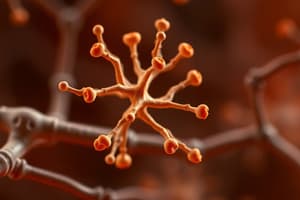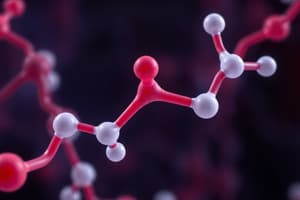Podcast
Questions and Answers
What condition is associated with excessively high levels of glutamate?
What condition is associated with excessively high levels of glutamate?
- Increased alertness
- Alzheimer's disease (correct)
- Muscle weakness
- Enhanced memory function
High levels of acetylcholine are commonly associated with muscle weakness.
High levels of acetylcholine are commonly associated with muscle weakness.
False (B)
What is a potential consequence of low glutamate levels?
What is a potential consequence of low glutamate levels?
Implicated in certain neurological conditions
Excessive glutamate can lead to ________, where nerve cells are damaged or destroyed.
Excessive glutamate can lead to ________, where nerve cells are damaged or destroyed.
Match the neurotransmitter with its associated condition for low levels:
Match the neurotransmitter with its associated condition for low levels:
Which neurotransmitter is primarily linked to mood regulation and sleep?
Which neurotransmitter is primarily linked to mood regulation and sleep?
High levels of GABA can contribute to increased anxiety and stress responses.
High levels of GABA can contribute to increased anxiety and stress responses.
What psychological condition is associated with low levels of dopamine?
What psychological condition is associated with low levels of dopamine?
Too much norepinephrine can cause symptoms of ______ attacks and increased heart rate.
Too much norepinephrine can cause symptoms of ______ attacks and increased heart rate.
Match the neurotransmitter to its associated condition when in low levels:
Match the neurotransmitter to its associated condition when in low levels:
What are symptoms of serotonin syndrome associated with high levels of serotonin?
What are symptoms of serotonin syndrome associated with high levels of serotonin?
Low levels of norepinephrine can lead to heightened alertness and focus.
Low levels of norepinephrine can lead to heightened alertness and focus.
Name a symptom associated with low GABA levels.
Name a symptom associated with low GABA levels.
Flashcards
Glutamate
Glutamate
The primary excitatory neurotransmitter in the central nervous system. It helps nerve impulses fire more easily.
High Glutamate
High Glutamate
Excessive glutamate can damage or destroy nerve cells, leading to conditions like stroke, Alzheimer's, or seizures.
Low Glutamate
Low Glutamate
A deficiency in glutamate may be linked to certain neurological conditions, but its effects are less well understood.
Acetylcholine
Acetylcholine
Signup and view all the flashcards
Low Acetylcholine
Low Acetylcholine
Signup and view all the flashcards
What are neurotransmitters?
What are neurotransmitters?
Signup and view all the flashcards
What can happen with neurotransmitter imbalances?
What can happen with neurotransmitter imbalances?
Signup and view all the flashcards
What is serotonin's role?
What is serotonin's role?
Signup and view all the flashcards
What happens with low serotonin levels?
What happens with low serotonin levels?
Signup and view all the flashcards
What is dopamine's role?
What is dopamine's role?
Signup and view all the flashcards
What happens with low dopamine levels?
What happens with low dopamine levels?
Signup and view all the flashcards
What is norepinephrine's role?
What is norepinephrine's role?
Signup and view all the flashcards
What happens with low GABA levels?
What happens with low GABA levels?
Signup and view all the flashcards
Study Notes
Neurotransmitters and Imbalance
- Neurotransmitters are chemical messengers transmitting signals across synapses, the junctions between nerve cells.
- Imbalances in neurotransmitter levels are linked to various psychological conditions and physiological functions.
- Too little or too much of a particular neurotransmitter can disrupt normal brain function, leading to symptoms specific to disorders.
Serotonin
- Serotonin plays a crucial role in mood regulation, sleep, appetite, and digestion.
- Low Serotonin: Linked to depression, anxiety disorders, sleep disturbances. Symptoms include persistent sadness, irritability, sleep difficulty, and changes in appetite.
- High Serotonin: Causes serotonin syndrome, a potentially life-threatening condition with symptoms like agitation, muscle rigidity, fever, and altered mental status. Usually results from medication increasing serotonin levels excessively, not necessarily high natural levels.
Dopamine
- Dopamine is involved in motivation, reward, pleasure, and movement.
- Low Dopamine: Associated with Parkinson's disease (tremors, rigidity, movement issues), depression, and ADHD (reduced motivation, pleasure, attention problems).
- High Dopamine: Excessive dopamine can cause psychosis (hallucinations, delusions), addiction, and impulsivity.
Norepinephrine
- Norepinephrine is involved in the body's "fight-or-flight" response, influencing arousal, alertness and focus.
- Low Norepinephrine: Characterized by lowered alertness, focus difficulty, weariness, and possibly depression.
- High Norepinephrine: Excessive levels lead to anxiety, panic attacks, insomnia, elevated heart rate, and can worsen existing conditions.
GABA (Gamma-aminobutyric acid)
- GABA is the primary inhibitory neurotransmitter in the central nervous system, reducing nerve impulse activity.
- Low GABA: Associated with anxiety disorders, seizures, and insomnia. Symptoms include increased anxiety, exaggerated stress responses, and difficulty relaxing.
- High GABA: Very high levels could reduce alertness and coordination, but this is not a major concern.
Glutamate
- Glutamate is the primary excitatory neurotransmitter in the central nervous system, enhancing nerve impulse activity.
- High Glutamate: Excessive glutamate causes excitotoxicity (nerve cell damage/destruction) and links to stroke, Alzheimer's disease, seizures, and neurological trauma.
- Low Glutamate: A deficiency may be implicated in some neurological conditions, but its effects are less understood.
Acetylcholine
- Acetylcholine is crucial for muscle function, learning, and memory.
- Low Acetylcholine: Linked to muscle weakness, memory impairment, and cognitive decline, particularly in Alzheimer's disease.
- High Acetylcholine: Unusually high levels are not typically associated with psychological conditions.
Note:
- Neurotransmitter imbalances often overlap, with multiple factors contributing to complex conditions.
- These explanations simplify complex biological processes.
- Identifying the underlying cause of imbalances requires thorough clinical assessment.
Studying That Suits You
Use AI to generate personalized quizzes and flashcards to suit your learning preferences.



